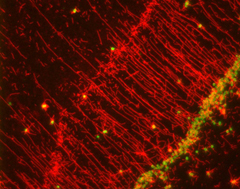
Molecular and cellular basis of microbial pathogenesis
The main interests of the group lie in studies of how bacterial pathogens cause disease in man. Our research is focused particularly on bacterial surface organelles termed Type IV pili (Tfp) or fimbriae. Tfp expressing bacterial pathogens are responsible for an extensive amount of morbidity and mortality worldwide. In addition, Tfp are associated with horizontal gene transfer and therefore contribute to the evolution of pathogenic and antibiotic reistant microbes. Based on both its relevance to other human diseases and its amenability to in vitro manipulation and analysis,we have chosen the human pathogen Neisseria gonorrhoeae, the agent of gonorrhea, as a model system.
Challenges
We use standard molecular biology strategies, together with classical genetic, genomic and proteomic approaches to elucidate the mechanisms of Tfp biogenesis and the structure/function relationships accounting for Tfp associated phenotypes. The intention is that by understanding the molecular basis for these processes, it will be possible to design rational approaches to preventing and controlling disease. Several international collaborations are ongoing.
Projects
- Tfp biogenesis and dynamics of expression:Our studies have been instrumental in defining a unique and ubiquitous pathway by which bacterial surface organelles are assembled.
- Tfp structure and components: A large array of mutants which have been used to demonstrate the association of minor components critical to Tfp function. In addition, post-translational modifications of the pilin subunit have been identified and characterized. Future aims are to determine the structure of the Tfp filament at atomic resolution.
- Function of Tfp in human cell adherence: In conjunction with the structural studies, Tfp associated components required for human cell adherence (and thus disease) have been identified and are being characterized.
- Function of Tfp in natural genetic transformation: Tfp, together with components related to Tfp expression, are involved in virtually all natural transformation systems in bacteria. Our work on the gonococcal system has revealed that an intact Tfp biogenesis machinery is essential to both the DNA binding and DNA uptake steps of transformation. Molecules dispensable for Tfp expression have also been found to act at these steps. Studies of the interaction of the Tfp biogenesis components and these ancillary factors are ongoing.
Recent achievements
Dynamics of pilus expression (PNAS 1998); essential genes in N. gonorrhoeae (EMBO J 2000); a unique pilus biogenesis pathway (EMBO J 2000) and identification of a novel pilus associated adherence protein (PNAS 2001).
Group leader (on sabbatical)
 Professor
Michael Koomey
Professor
Michael Koomey
Department of Molecular Biosciences
PO Box 1041 Blindern
NO-0316 Oslo, Norway
Tel: +47 22854091
Fax: +47 22856041
E-mail: j.m.koomey@imbv.uio.no
Acting group leader
 Postdoctoral fellow Marina Elisabeth Aspholm
Postdoctoral fellow Marina Elisabeth Aspholm
Department of Molecular Biosciences
University of Oslo
P.O. Box 1041 Blindern
NO-0316 Oslo, Norway
Tel: +47 93288266
Fax: +47 22856041
E-mail: marinasp@imbv.uio.no

Neisseria gonorrhoeae expressing type IV Pseudomonas pili (immunofluorescence microscopy - cells/green, pili/red).
PO Box 1105 Blindern, NO-0317 Oslo, Norway. Tel: +47 22851528. Fax: +47 22851488